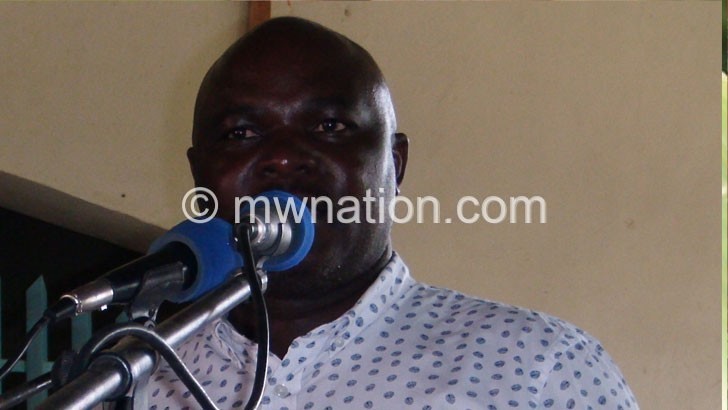Covid-19 risk rises
Effectiveness of self-quarantine in the management of the coronavirus (Covid-19) pandemic, especially in high density residential areas, has come under the spotlight after one case in Kaliyeka, Lilongwe infected 14 others within 48 hours.
Following the Kaliyeka scenario, health experts have warned that the country’s capital city is at high risk of recording more coronavirus cases.
The reactions followed an announcement by Minister of Health Jappie Mhango yesterday that 10 new cases were confirmed in Lilongwe and were linked to the five cases confirmed on Wednesday. Four of the five were traced to another case announced on Tuesday.
Said the minister: “On the cases, let me inform the nation that we have registered additional 10 cases in the last 24 hours. The cases from Kaliyeka are coming from the primary contacts of the five confirmed cases that we announced yesterday [Wednesday].”

By close of business yesterday, Malawi, which reported its first three cases of the global pandemic on April 2, had 33 Covid-19 cases, including three deaths. Lilongwe has the highest number of cases at 22.
In an interview yesterday, clinical psychologist Dr. Chiwoza Bandawe said the positive cases and those whose samples have been collected may not easily admit because of fear of stigma as no one wants to be associated with a pandemic of Covid-19 type; hence, the need for institutional quarantine.
He said self-quarantine in low-income and high density residential areas may not be practical.
Said Bandawe: “If we insist on self-quarantine then we need strict supervision to contain further spread. But what is more practical is institutional quarantine where the patients will be closely monitored and also have some counselling to cope with the pandemic which may affect someone mentally.”
He said the fact that some people are downplaying or dismissing the tests is a cause for worry because they will continue doing business as usual; hence, unknowingly or knowingly spreading the virus.
Bandawe, who teaches at College of Medicine—a constituent college of the University of Malawi, observed that those who have recovered from the pandemic may also share stories of hope to demonstrate that testing positive is not the end of life.
From the four cases announced on Wednesday, Ministry of Health (MoH) traced 24 contacts and took samples. It was from the 24 samples that 10 tested positive.
While MoH could not disclose the number of contacts traced to the 10 positive cases, our sources at Lilongwe District Health Office (DHO) confided that at least 20 samples had been collected by close of business yesterday.
Sources at Lilongwe DHO and the testing laboratory confirmed about samples being collected from Kaliyeka and surrounding areas. The sources said most people do not want to be known to have been tested.
Said one source: “We have been collecting samples from Kaliyeka and there is a long contact list. From what I have seen so far, we are likely to have more positive tests.
“I do not know why some people think this is fake? We are working 24 hours and the local transmission is scaring. If we go about dismissing the tests we are likely to put more lives in danger. I fear for Lilongwe if business continues like this.”
The source also appealed to government to move in fast and consider institutional quarantine over self-isolation which is proving a problem in high-density areas.
In the wake of the first three cases reported in Lilongwe on April 2, Lilongwe City Council in collaboration with the DHO and communities around the low density Area 9 effected a lockdown of the compound where the three cases were living. Movement within the area was also restricted. This arrangement worked and the three have since recovered.
On what they intend to do about Kaliyeka, which has become a Covid-19 hotspot, Lilongwe City Mayor Juliana Kaduya said there were no plans yet because the area’s ward councillor reported to the council that the results were not correct.
In a separate interview, Kaliyeka Ward councillor Richard Banda, who is also Lilongwe City Deputy Mayor, said he was in touch with the people reported to have tested positive and all of them were ignorant of such tests.
He said: “I have checked with the concerned people they are saying government only noted down their names, but no samples were collected. These people will be stigmatised.”
During yesterday’s briefing, Mhango said the cases in Kaliyeka are linked to a resident who recently returned from Tanzania and has since succumbed to the novel pandemic.
Our investigations established that Lilongwe DHO was proactive in following up cases; hence, the high number of cases and traced contacts.
From our assessment, the team has made over 100 tracing to all the cases reported in the city
An official at MoH confided in The Nation that the team at Lilongwe DHO was following up cases even from social media.
“It’s not that other DHOs are not doing the best they can, but Lilongwe DHO team needs to be patted on the back. They are really doing the best,” said the source.
Apart from the 22 cases in Lilongwe, Blantyre has eight with one death while Chikwawa, Zomba and Nkhotakota have one case each.
A mathematical modelling estimates that 50 000 people may die of Covid-19 in Malawi if the pandemic persists for a year with Lilongwe being the hardest hit.
On December 31 2019, the World Health Organisation (WHO) was alerted of several cases of pneumonia of unknown cause detected in Wuhan City, Hubei Province of China. WHO declared the Covid-19 outbreak a pandemic on March 12 2020.
President Peter Mutharika declared Malawi a State of Disaster on March 20 in the wake of the Covid-19 pandemic and announced several precautionary measures, including closure of schools and banning of gatherings of more than 100 people.





